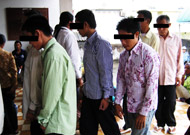Nine residents found guilty of assaulting Cambodian police during land eviction
Published on 10 July 2007On the morning of April 20, 2007, 13 residents from Village 6 in Sihanoukville's Mittapheap district were arrested after they tried to defend their homes against the onslaught of 150 police attempting to evict them and 105 other families. On Tuesday July 3, 2007, the 13 appeared before the Sihanoukville Municipal Court for their trial; the next day five were acquitted and nine were convicted (one in absentia).
During the April 2007 raid, 60 houses were burnt down and the other remaining houses were completely demolished by an excavator. The evicted families were not permitted to remove possessions from their homes before they were destroyed and many lost important documents which would have been essential for determining ownership of the land. The 13 residents were arrested and charged with "wrongful damage to property" (Article 52 of UNTAC Law) which related to the alleged destruction of police equipment by the residents and "battery with injury" (Article 41 of UNTAC Law) for allegedly attacking the police during the eviction.
The land dispute began in September 2006 when peaceful ownership of the land by the community (in the case of some of the families dating back to 1985) was for the first time publicly contested. In quick succession, several attempts at eviction followed despite the residents' appeals to the authorities to conclusively resolve the ownership question before driving them off the land. Finally on 20 April 2007, armed forces supported by a fire-truck and an excavator raided the village and demolished the residents' houses. No notice was given to the community prior to the police action, and the authorities later claimed to have ordered the raid based on a "search warrant".
During the trial, the prosecution could not produce any evidence that actually linked the individual residents to the crimes they were accused of
When the police officers who testified for the prosecution were asked to point to an individual that had allegedly assaulted them or caused damage, they could not single out any one person. Likewise, the written police statements did not identify any of the individual residents as assaulting them or causing damage. Finally the court also did not consider the possibility that the residents responded to the police raid in self-defense in a desperate attempt to protect their belongings and the well-being of their families.
Despite the complete absence of evidence produced by the prosecution to clearly establish individual responsibility for the alleged offenses of any of the 14 defendants, after the two-day trial, the following judgment was given on July 4, 2007:
▪ Only five residents were cleared of all charges and acquitted by the court.
▪ Seven residents were sentenced to 75 days imprisonment on varying legal grounds.
- three were found guilty of having committed "battery with injury" (Article 41 of UNTAC Law) and "wrongful damage to property" (Article 52 of UNTAC Law);
- two were found guilty of complicity (Article 69 of UNTAC Law) in causing "battery with injury" and "wrongful damage to property", the two men had allegedly gathered stones which other residents apparently threw at the police; and
- the remaining two others were found guilty of complicity in attempting to cause "wrongful damage to property", the two men had allegedly thrown stones at the fire-truck but failed to cause any damage.
▪ Two residents were sentenced to 8 months in prison for "battery with injury" and "wrongful damage to property" (Articles 41 and 52 of the UNTAC Law). Both sentences will be suspended after 4 months and will be followed by a five-year period of parole. Only one of these two residents was present in court, the other was sentenced in absentia.
According to the judgment, the individual 75 days and 8 months sentences became effective from the day of arrest on April 20, 2007. Therefore the seven residents who were sentenced to 75 days had already served their sentence in pre-trial detention and should have been released from prison on July 4. However shortly after the trial, the Sihanoukville Municipal Court Chief Prosecutor Meas Sopheak appealed the sentences of all nine convicted residents and they all remain in prison awaiting the Appeal Court hearing.
LICADHO is troubled by the level of evidence produced at the trial and used to convict the nine residents. During the trial, the court was not concerned with the legality of the eviction, the level of force used by the police to carry out the eviction or the possibility that the residents were acting in self-defense. The court was also not concerned with the inability of the police to clearly identify the individuals who were allegedly responsible for the assaults and damage caused.
LICADHO calls for the immediate release of the seven residents who were sentenced to 75 days imprisonment and who had completed their sentences on July 4, but still remain in detention. The practice of keeping people in detention past the completion of their sentences, to await the prosecution's appeal is a serious violation of human rights. Although the National Judicial Conference for 2002 decided to incorporate circular No. 01/2003 of the Ministry of Justice that specifies "the accused person can not be released if the prosecutor or civil plaintiff appeals the case until the case of the higher court becomes final.", the circular is incompatible with fair trial standards enshrined in the Cambodian Constitution and the International Convention on Civil and Political Rights (ICCPR). These situations tend to lead to the increased sentences, since the appeal courts in Cambodia tend to "adjust" the prison sentence in accordance with the time that has elapsed between the initial trial and the appeal trial, which in some cases can be over two years.
- Topics
- Judiciary/Rule of Law Land Rights
- Related








